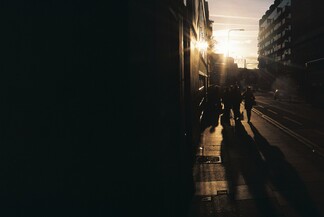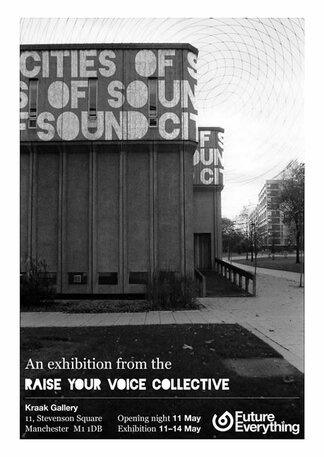
The collective I co-founded, Raise Your Voice, has just announced its latest venture: an exhibition of sound installations plus live performance entitled Cities of Sound as part of FutureEverything Festival 2011. Read more »

The collective I co-founded, Raise Your Voice, has just announced its latest venture: an exhibition of sound installations plus live performance entitled Cities of Sound as part of FutureEverything Festival 2011. Read more »
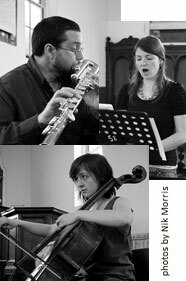
Good friends Trio Atem make their London début on 4 April with a concert as part of the innovative ‘Out Hear’ series at Kings Place. Gavin Osborn (flute), Nina Whiteman (voice) and Alice Purton (cello) present a programme of new music by composers based in the North West of England alongside the work that first brought them together, Helmut Lachenmann’s temA. Also included in the programme is a newly revised version of my …going back to the skies, which they first premièred last year. Here is the programme in full:
Michael Mayhew’s work comes from his series of graphic scores, The Alchemy Collection, which first premièred in the autumn at the Whitworth Art Gallery in Manchester. Here are some images of ‘Vinyl Radical’ from the series:

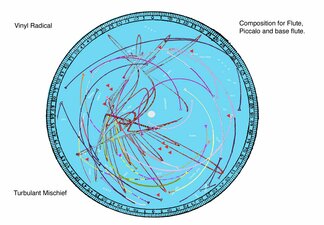
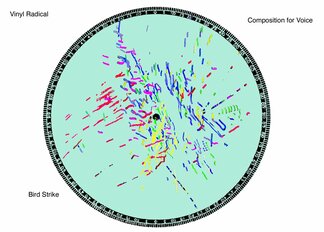
It should be a great concert and I’m looking forward to it immensely, so buy your tickets now!
Listings: Venue / Facebook / Last.fm / MySpace / Songkick

As it’s International Women’s Day, I wondered how well that most reactionary of musical beasts, the orchestra, would stand up to tests of gender equality. I wondered how many female composers were being performed by Manchester’s three orchestras this season, and then expanded my research into conductors, soloists and rank and file player numbers. Perhaps unsurprisingly, the numbers don’t look great.
Let’s start with the good news. Between them, Manchester Camerata, The Hallé and the BBC Philharmonic list 193 musicians as players on their websites. Of these, 93 are women, or 48.2%. According to a 2009 Mid-Year Population Estimate available from Manchester City Council women make up 48.8% of the population in Greater Manchester, so that proportion looks spot on. It is worth noting however that gender balance within sections of the orchestra seems to vary: the strings containing more women while brass sections tend to contain more men. The proportion of women to men across orchestras is brought down by the BBC Philharmonic, whose ratio is closer to 3 women to 4 men.
That’s about where the good news ends. Of 77 soloists this season, just 27 are women, a lousy 35%. That looks even worse if you take singers out of the equation, dropping to 31.8%. That means less than a third of the musicians performing concerti in Manchester are women.
The landscape for female soloists looks a lot better than that for conductors though. That’s because if you were to take Manchester orchestras as your guide there aren’t any. Not a single woman is being employed as a conductor by any of the Manchester orchestras this year. Not one. But 34 men are.
Coming back to my initial curiosity. How many female composers are being performed by these institutions? The answer is: two. 99 names appear on programmes, some multiple times, but the other 97 are all male. The names of this apparently lucky couple are Nina Whiteman and Sally Beamish. Nina’s Windows on the Neva was premiered by Manchester Camerata in October, while Sally Beamish’s The Song Gatherer (Cello Concerto No. 2) was performed by Robert Cohen with the Hallé in December. Of course, the historical nature of orchestral programming means that orchestras will have a quick defence: ‘the absence of female voices is an unavoidable reflection of historical society.’ Hence the fact the only music by women composers played this season is by living composers. Fair enough, but 13 different works by living composers were performed by these orchestras. 2 composers out of 13 still leaves us with just 15.4% women.
So, where are the women in your local music scene? It’s not that they don’t exist, but they are being neglected by some of the most highly funded and prestigious musical institutions. In a recent article for the San Francisco Chronicle, Joshua Kosman wrote, ‘music lovers ought to be having a real debate about just what it means for an artistic edifice so grand and arresting [as the Vienna Philharmonic] to be built on a foundation of more-or-less explicit sexual and racial discrimination.’ His criticism holds true to greater and lesser extents for orchestras around the word. I would urge you to do the maths, work out what your local orchestra — or whatever cultural institution you value — looks like demographically and ask the difficult questions.
Sources: Manchester Camerata season brochure; printed BBC Philharmonic season brochure; downloadable calendar from The Hallé; player lists on the websites of all three orchestras.
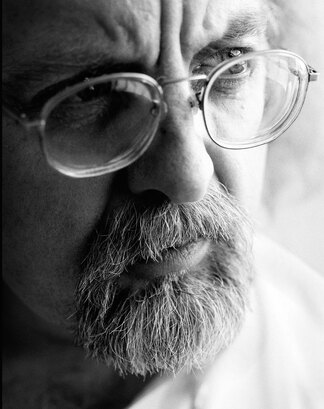
In the last week and a half it has been interesting to observe from a distance the build-up and fall-out from the Ferneyhough day in London. Thankfully, the Radio 3 broadcast meant I could hear the music as well as the surrounding reaction. Radio 4 ran an item on the Total Immersion day apparently designed so as to scare off unfamiliar listeners — or is any publicity good publicity? — and the blogosphere swelled with responses to both the music and the accompanying verbal material, either in pre-concert talks or programme notes. You can hear the Radio 4 item on The Rambler where there are also two reviews. Other reviews can be found at Composition Today, Boring Like A Drill (who also wrote about the Today programme item), the Guardian, Telegraph and London Evening Standard. Interestingly enough, this was the same week that Anna Nicole opened at the Royal Opera House and despite vast musical differences — and the hype for Turnage’s opera has been something else entirely — these two events seemed to stir up some similar debates: about comprehensibility, accessibility (what that means and whether it is necessary or valuable) and the position of art in wider society. Important debates to be having.
Most interesting from the position of an ‘outside’ observer was how much the presentation of Ferneyhough’s thought at the Barbican seemed to have alienated people. At first this didn’t surprise me — Ferneyhough has a fearsome reputation in a similar way to how ‘Darmstadt’ still provokes an unwarranted and outdatedly fearful response among Anglophone audiences — but then I saw him speaking at the Royal Northern College of Music on Monday. He came to work with some of the students, present one of his newest works, Sisyphus Redux, in a workshop with flautist Richard Craig and field questions from the audience in an open forum. Observing one of the student rehearsals on Sunday night, I was impressed by how unbelievably perceptive he was in rehearsal, pulling up the players for the quarter tones and fractional rhythms that so often get glossed over as gesture or detail merely present to give a sheen of complexity to the work. It would be foolish to fetishise the composer’s ears, but it is worth noting that he knows what he wants and it is not just about compromising the performers’ comfort. Talking about the short string quartet movement Adagissimo (which you can watch with score on YouTube), he told the violist and cellist, whose material is a slow-moving harmonic layer in contrast to the violins’ fast, harmonically static, jerkily reiterated gestures, that their material was ‘Sehnsuchtsmusik like Tristan & Isolde and that rubbish’, it was ‘leading note harmony’, their 1/8 tones were there to push at each other, never quite reaching a promised pitch. A later tritone between the lower strings he described as ‘unresolved longing’. He seemed to be a composer heavily aware of his musical history and tradition, but not ‘geeky’ (as one commenter on Composition Today perceived it) or deliberately obfuscatory.
It was a similar story in his workshop with Richard Craig and later the open forum chaired by Fabrice Fitch. The workshop was intensely practical, moving through the score, explaining notational practices and compositional processes, rehearsing details in the flute part, discussing difficulties. Sisyphus Redux uses the idea of Sisyphus’s daily struggle of rolling his rock up the mountain as a compositional impetus, each line of the score representing the composer’s attempt to outthink the gods and find a novel way round the challenge of getting the metaphorical rock up the mountain. These phrases are not perceptible to the listener, the title refers simply to the compositional impulse. In most of the work there are two simultaneous lines (or voices or processes, if you prefer) and Ferneyhough jokingly observed ‘It turns out that it’s much harder to do two lines on one instrument than it is say on a piano. I don’t know why that is but it just ends up like that.’ There is a sympathy for the difficulties the performer faces that doesn’t resolve itself in avoiding possibilities simply because they’re difficult. As he put it, ‘I’m really offering the player multiple paths through the learning process.’
In the forum there were moments that might have come across as more ‘academic’, i.e. using potentially unfamiliar terminology. What Tim Rutherford-Johnson observes in Les froissements d’ailes de Gabriel as an attempt ‘to create a musical thread that is impossible to assimilate, such that barely grasped recollections and images pile up in the memory, like the detritus of history, to be sorted through on some as-yet-undetermined future occasion’ seems to me to be a characteristic attempt on Ferneyhough’s part to engage very directly with questions about how the audience is listening. Ferneyhough said ‘musical language carries its history on its back’ so it is hardly surprising given his historical position that he is aware of and sometimes uses terminology borrowed from research in to perception and brain science. That’s not academic or obscure, it’s an honest attempt to deal with the realities he faces as an artist in a rational fashion. However, given the opportunity, he readily spoke in as clear terms as possible about the problems faced by both interpreters and listeners. Given the persistent richly detailed surface of this music, how does the performer find the ‘optimum window of regard’ so as to position this constant flow of information in relation to the wider form? This question is not some obscure experiment in cognitive science but instead the age-old question of how do we make this speak? How do we give people a chance to engage with this material?
So what happened in the London talks? Were they set up with old expectations unquestioned or did Ferneyhough feel he was talking to two very distinct audiences and adjust his rhetoric accordingly? It seems a shame if the opportunity was missed to re-evaluate a composer more thoroughly in front of what was presumable a large-ish audience.
Hearing Richard Craig’s explosive performance of Unity Capsule on Monday afternoon, I was aware that the relationship of parts to the whole was somehow different from what I was used to. A friend recently said he was bothered that in his own music he was somehow leading his listener by the hand too much: ‘here is this material, now here is something different, now here they are transforming and interacting, etc.’ I exaggerate, but it is true that there is a remarkable lack of this in Ferneyhough. To borrow from information theory: there seems to be very little redundancy in the system. There is no unnecessary grammar couching material to clarify it, instead there is a constant flow (of many streams) whose form is ineffable yet still felt. At the end of Unity Capsule, I would not have been able explain — as is often possible — how the work fitted together in terms of sections and material nor does it fall into that category that includes something like Georg Friedrich Haas’s long-breathed, gradual transitions. Instead I felt a superficially inexplicable coherence, perhaps measurable most straightforwardly as the level of energy varying over the course of the work, which ratcheted up quite significantly in the last third, but must be put down to a masterful achievement on the part of both composer and performer in reaching past our self-aware listening apparatus to connect with us in a different way.
Towards the end of the open forum Ferneyhough said, ‘I don’t like the idea that music is separated from life.’ The debate that Anna Nicole provoked — does it bring a tradition back to general relevance — is in fact one many musicians engage with, but in multifaceted ways. The route of polystylistic music and pop-cultural plot lines is one of many such engagements not an isolated beacon.
As a footnote: One nice bit of fall-out from the recent focus on Ferneyhough is that you can download some of his scores, including the pieces played at the Total Immersion day, from Edition Peters: http://issuu.com/editionpeters/docs
On Sunday, my tape piece from last summer inspired by the lightness and quickness of aural experience in urban spaces, La leggerezza delle città, will be played as part of the 15th biannual Manchester Theatre in Sound (MANTIS) Festival. This edition bears the title ‘Manchester’s Sonic Meta-ontology’ and will explore Manchester’s sounds through a variety of concerts and installation pieces. You can find it here on Facebook.
On Monday, my solo piano work 3 Sunsets receives its second performance by good friend Sebastian Grand. He plays a programme of landscape-inspired works that also includes Ligeti’s Arc-en-ciel, Takemitsu’s Rain Tree II and Cage’s In a Landscape in a short afternoon recital at the Royal Academy of Music. It’s in the David Josefowitz Recital Hall at 2pm.
